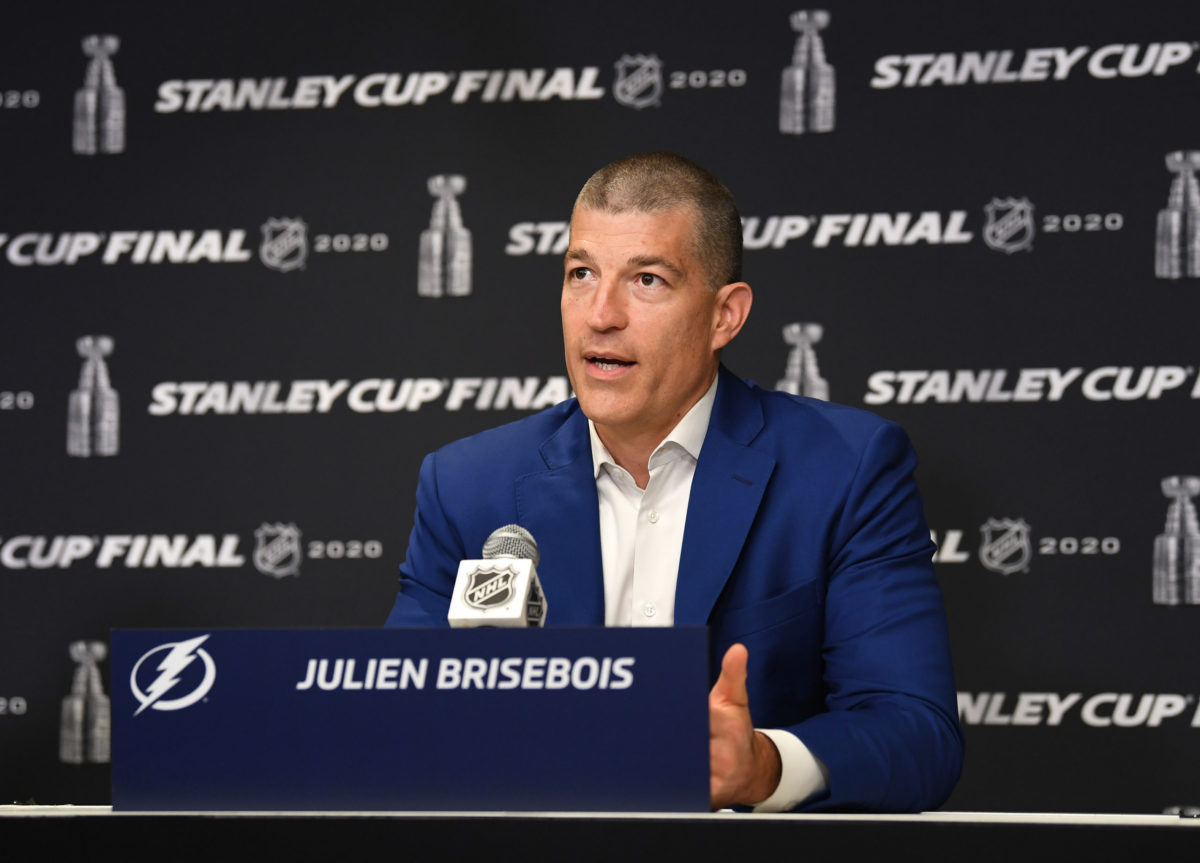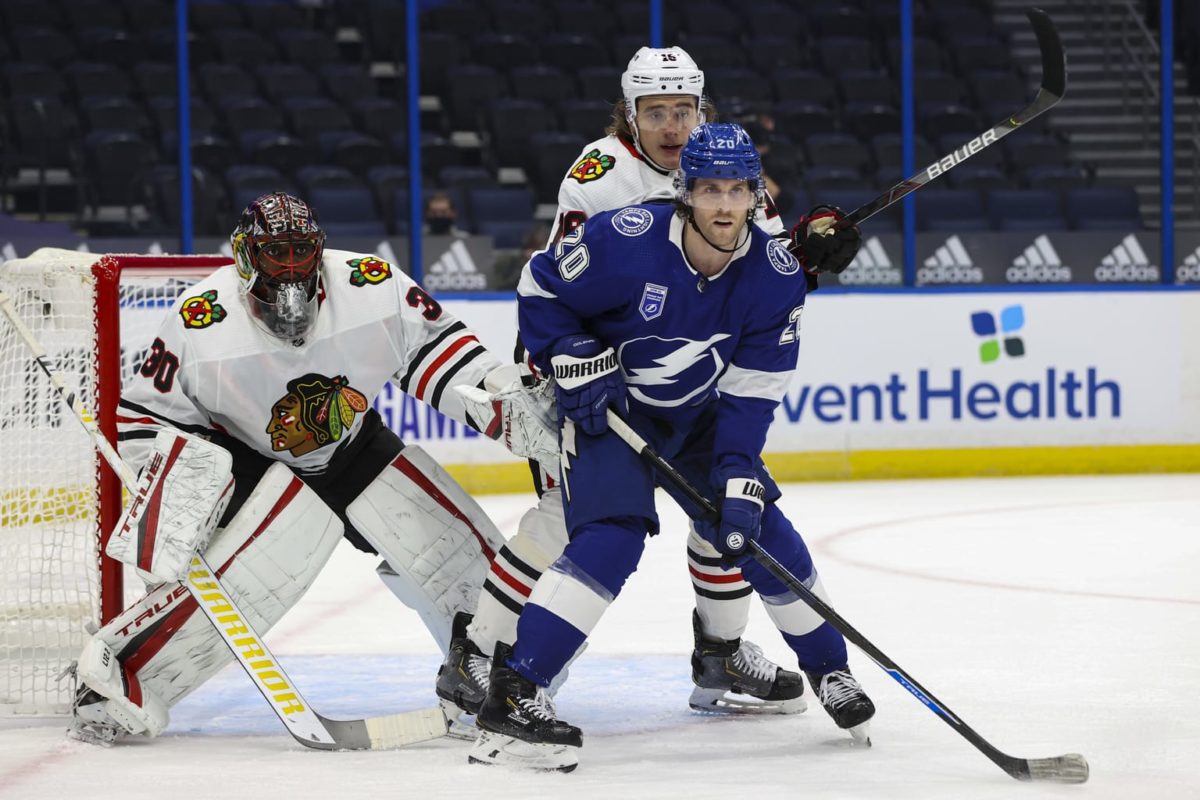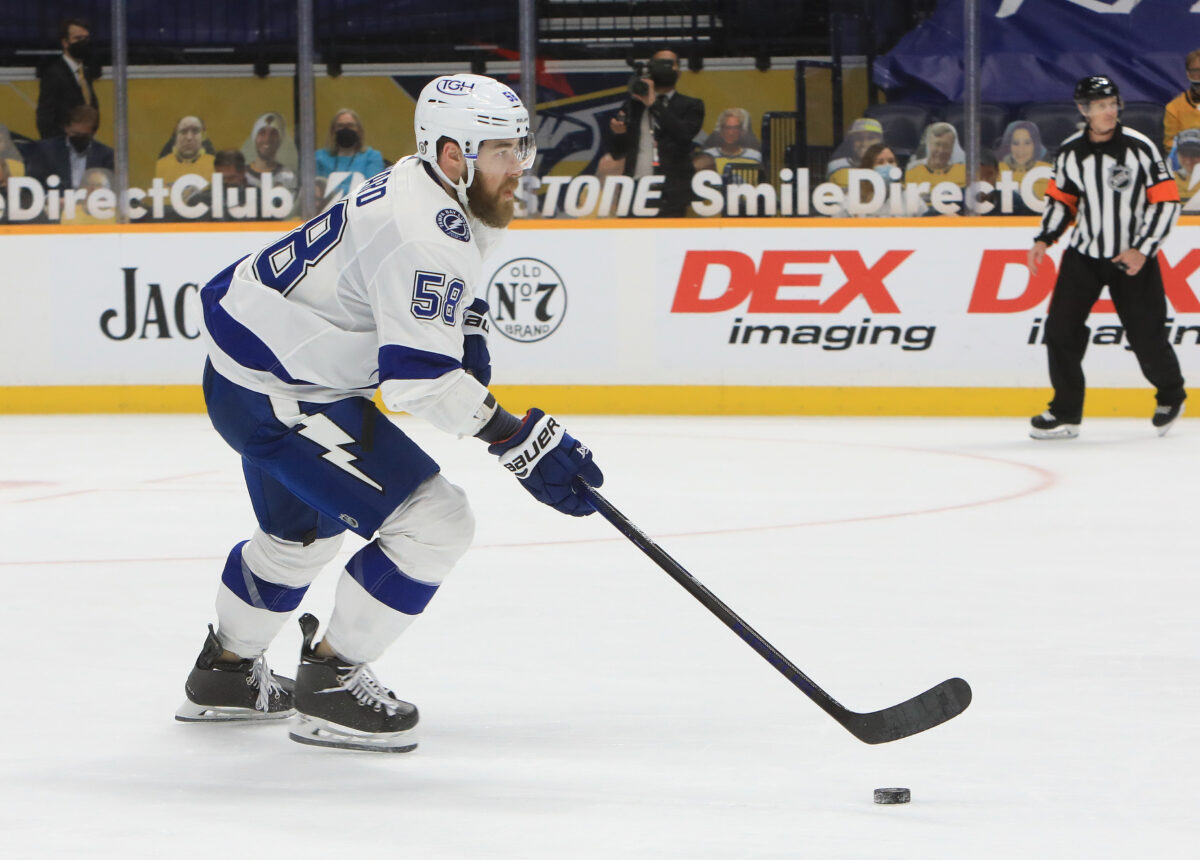As the Tampa Bay Lightning navigate their way through the remainder of the 2020-21 regular season, let’s take a look towards the near future called the 2021 offseason. While that may feel like it is still a lifetime away, in reality it is right around the corner, even if the team goes on a deep playoff run.
This offseason, the Lightning find themselves back in a precarious cap position. While they were able to successfully navigate the cap this season with some creative uses of Long-Term Injury Reserve, they appear to be right back in the same situation as they were last offseason, with little to no cap space available to sign players.
While some of this can be rectified by trading a veteran player on an expensive contract, it is still going to take some work for general manager Julien BriseBois to ice a complete team and stay cap-complacent. The good news for the Lightning is that they don’t have the glut of high-end restricted free-agents (RFA’S) due contracts this season as they did last year. Many of their RFA’s are complementary players who will likely receive minor pay-raises if they are kept around the franchise.

When it comes to Unrestricted Free-Agents (UFA’s) however, the Lightning find themselves in a much more difficult position. Many veteran players who were acquired through trade are now reaching the end of their contracts, and BriseBois will have to decide if he can find the money to re-sign these players or if he will have to let them walk away in the offseason.
Lightning Have Hard Decisions to Make With Forwards
At the 2020 trade deadline, Tampa Bay went all in when they made two blockbuster trades to acquire Blake Coleman and Barclay Goodrow. These trades were expensive not only because of the caliber of player involved, but because both Coleman and Goodrow were on reasonable contracts for their production, and those contracts lasted until the 2021 offseason, giving the franchise more options in the 2020 offseason.
Ultimately, these trades worked out, as the Lightning won the 2020 Stanley Cup with both players contributing key minutes on the third line. Not only that, they continued playing alongside Yanni Gourde throughout the 2020-21 season, and will be looking to act as a battery for the Bolts as they push for their second straight Cup.
Now, the bad news is that whenever their postseason ends, both players will be due new, more expensive contracts. While they will absolutely be worth their raises, it’s difficult to see how Tampa Bay can fit both under the cap.
Off the top, Coleman seems the least likely player to stick with the Lightning. After signing a three-year, $5.4 million extension back in 2018-19, he immediately outplayed this contract, posting back-to-back 20 goal seasons with the New Jersey Devils. Even after he was traded to Tampa Bay and saw his overall ice-time reduced as he took on more of a depth role, he still has chipped in 10 goals and 14 points this season so far.

With his style of play and those scoring numbers in mind, I would expect Coleman to receive a meaningful raise this offseason, likely somewhere in the $3 to $5 million range. If they had the space available, the Lightning would love to keep him around, but even at the low end of that range, it will be hard to make that fit under the cap.
Goodrow, on the other hand, could be a long-term value signing by Tampa Bay. While he isn’t a high-end scorer, his all-around play will make him attractive to a lot of teams. However, given how well he has fit with the Lightning, he might be willing to take a longer-term deal at a reduced cap hit rather than move to a new city.
In this scenario, I could imagine him getting a three to a four-year extension in the $1.5 to $2 million range, which would be doable for the Lightning. Now, he could always get a bigger offer from another team, but it’s hard to tell if a franchise would give him a deal above $3 million per year, even if he is a great all-around player.
Defensive UFA’s Could Set Lightning’s Future
On defense, the Lightning also have two big-name players who will be UFA’s this offseason. The first is Luke Schenn, who has been with the team since the 2019-20 season. While he has his uses in the postseason, Schenn simply is a depth defenseman that could be replaced from within. So, it would make sense for the franchise to walk away from him this offseason to give their youth more of an opportunity to play, unless if he is willing to re-sign at a league minimum contract.
The other defenseman who will be reaching UFA status this offseason is none other than David Savard, whom BriseBois acquired for a run at the 2021 Stanley Cup. While Savard was seen as a pure deadline rental, the Lightning would still love to find a way to bring him back beyond the postseason if he ends up becoming a full-time partner for Victor Hedman.
See, throughout his Lightning career, Hedman has struggled to find a consistent top-line partner. If Savard can take over that role and make some real noise throughout the playoffs, it could be well worth finding a way to scrape together enough cap space to re-sign their deadline splurge.

The problem with this, of course, is finding that money. Even if the Lightning were able to clear a significant amount of cap through trades, Savard will likely command a contract paying somewhere between $4 to $5 million. Given his age and style of play, that sort of extension is risky, but it is one that BriseBois would be happy to make if it allowed him to lock down a consistent, top-four defenseman heading into the 2021-22 season.
Lightning Have More Players to Re-Sign
Of course, the Lightning have more players to re-sign or replace this offseason. Veteran backup goaltender Curtis McElhinney could be on the outs with the franchise, as they may look to add a younger option behind Andrei Vasilevskiy. I could also see stopgap starters like Gemel Smith, Ben Thomas and any of the additional taxi-squad players depart Tampa Bay as the option to stash them without affecting the cap will likely go away for 2021-22.
This could cause the franchise to lose a lot of depth, especially if those players leave along with names like Coleman, Goodrow, and/or Savard. It’s not that the Lightning can’t absorb this loss, of course. It’s just that it gets harder and harder to find quality replacements when you have no room to work against the cap. As we have learned, depth wins Stanley Cups, but it can be difficult if not impossible to acquire and retain that depth in a salary cap world.